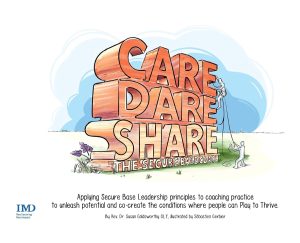By Rev Dr Susan Goldsworthy, above, is an Olympic finalist and author of Care Dare Share: The Secure Base Coach
In today’s fast-paced and ever-changing business environment, small and medium-sized enterprises (SMEs) face unique challenges. From navigating market volatility to managing limited resources, SMEs must find ways to build resilience within their teams to ensure sustainable success. At the heart of this resilience are two critical factors: connection and trust. These elements are not just soft skills or nice-to-have attributes; they are the bedrock of high-performing teams and, by extension, thriving businesses.
In an increasingly fragmented world, teams thrive when individuals feel connected to each other and to their shared purpose. A sense of connection fosters open communication, which in turn encourages collaboration and innovation. When employees trust one another, they are more likely to share ideas, experiment, and take calculated risks, all of which are essential for enhancing creativity, driving innovation and staying competitive. Connection and trust also play a pivotal role in employee engagement.
Studies consistently show that employees who feel a strong sense of belonging and trust within their teams are more committed to their organizations. For SMEs, which often cannot match the compensation packages of larger corporations, fostering a culture of connection and trust can be a powerful tool for retaining top talent. Teams that are grounded in trust and connection can adapt more effectively. They communicate openly, support one another, and are better equipped to navigate challenges. For SMEs, this adaptability can mean the difference between surviving and thriving.
The Secure Base Model: A Framework for High-Performance Teams
According to Anthony Venus, Founder, Luminous & Partner, CEO Coaching International, “When leaders embody secure base coaching, they create a positive environment, focus on the future, invest time in developing others, show empathy and self-awareness, and encourage others to take responsibility and try new ideas. This approach unleashes the potential in each individual to grow, contribute, impact, and help organizations thrive. It is vastly different from old-school, command-and-control, fear-based management techniques, which sadly still exist in the corporate world. Secure base coaching provides the warmth and respect that everyone yearns for and can enjoy giving to their teams, enabling them to thrive and leaving a positive mark on their careers and our organizations for the future.”
The concept of a “secure base” originates from psychology but has profound implications for team dynamics. Rooted in the work of Bowlby and Ainsworth, and influenced by the work of Rogers, a secure base is a person, relationship, or environment that provides a sense of safety, enabling individuals to take risks, unleash potential, and perform at their best. Team members need to know that their leaders and colleagues are accessible and approachable. For SME leaders, this might mean having an open-door policy, being present during critical moments, and consistently showing up for the team. Availability signals accountability and that support is readily available, fostering trust. When people show vulnerability and are genuine, this also strengthens trust, as it humanizes leaders and fosters deeper connections with team members.
By co-creating an environment where team members feel safe to express their thoughts, admit mistakes, and ask for help without fear of judgment or retaliation, psychological safety can be achieved. This involves active listening, empathy, and a commitment to addressing conflicts constructively. It’s important to stress that creating a secure base space is not just about safety; it’s also about challenge. When people feel accepted, they then want to have a sense of achievement. Secure base leaders encourage their teams to step outside their comfort zones, take on new challenges, and pursue innovative ideas. When individuals know they have a safety net, they are more likely to take risks that drive growth and performance. When acting as secure base coaches, SME leaders unleash potential in their teams enabling them to be in the ‘Play to Thrive’ space where productive energy is released, where people feel in a state of wellbeing, and high performance abounds.
Five Practical Strategies for Building Connection and Trust in SMEs
- Invest in Team-Development
Whether it’s a workshop, a retreat, or even regular informal gatherings, ongoing activities that focus on shared experiences and mutual understanding can strengthen connections, help break down barriers and build camaraderie. - Prioritize Transparent Communication
Trust is rooted in transparency. For SMEs, where resources and time are often stretched thin, clear, courageous communication can prevent misunderstandings and build collective buy-in. This is why it is important to raise issues as soon as they occur and clear up any misunderstandings. - Foster a Culture of Appreciation
Recognition and appreciation go a long way in building trust and connection. SMEs can establish simple yet meaningful practices, such as regular shout-outs in team meetings, personalized thank-you notes, or celebrating failures and wins, both big and small, reinforcing a sense of shared purpose and belonging. - Develop Empathy and Emotional Intelligence
This involves understanding and managing one’s emotions, empathizing with others, and navigating interpersonal dynamics effectively. Creating spaces where people can share how they feel, give each other constructive feedback and where all emotions are considered valid contributes to creating close-knit teams. - Align on Shared Values and Purpose
Connection is strengthened when team members feel aligned with the organization’s values and see how their work contributes to a larger purpose. Involve others in the co-creation of a meaningful purpose and values that are lived (versus solely being on posters and coasters).
Connection and Trust for Resilience
Building resilient teams in SMEs is not just about implementing processes or meeting targets; it’s about cultivating the human elements that drive success. Connection and trust are the glue that holds teams together, enabling them to navigate challenges, innovate, and thrive in a competitive landscape. By embracing secure base principles and adopting practical strategies to foster trust and connection, SME leaders can not only lay the foundation for high-performance teams but also step into the role of secure base coaches. Here, they provide the emotional safety and encouragement that empower their teams to take risks, grow, and perform at their best. In doing so, SME leaders achieve business success through creating workplaces where people genuinely want to belong, contribute, and excel.
 Rev. Dr Susan Goldsworthy is an Olympic finalist, award-winning author, executive coach, and speaker with more than 40 years of corporate experience. She is author of new book Care Dare Share: The Secure Base Coach, published by IMD and is Co-Director (Lead) of IMD’s Executive Coaching Certificate and Program Director of the Leadership Skills for Sustainable Change program.
Rev. Dr Susan Goldsworthy is an Olympic finalist, award-winning author, executive coach, and speaker with more than 40 years of corporate experience. She is author of new book Care Dare Share: The Secure Base Coach, published by IMD and is Co-Director (Lead) of IMD’s Executive Coaching Certificate and Program Director of the Leadership Skills for Sustainable Change program.


